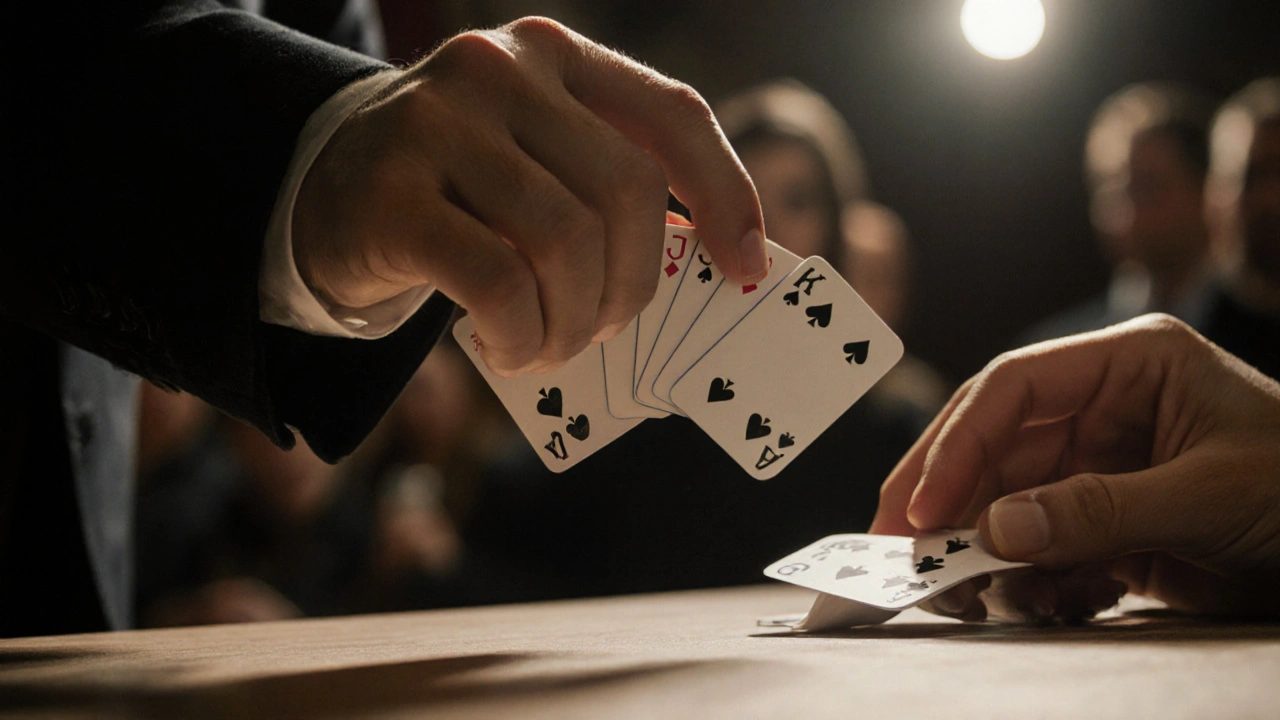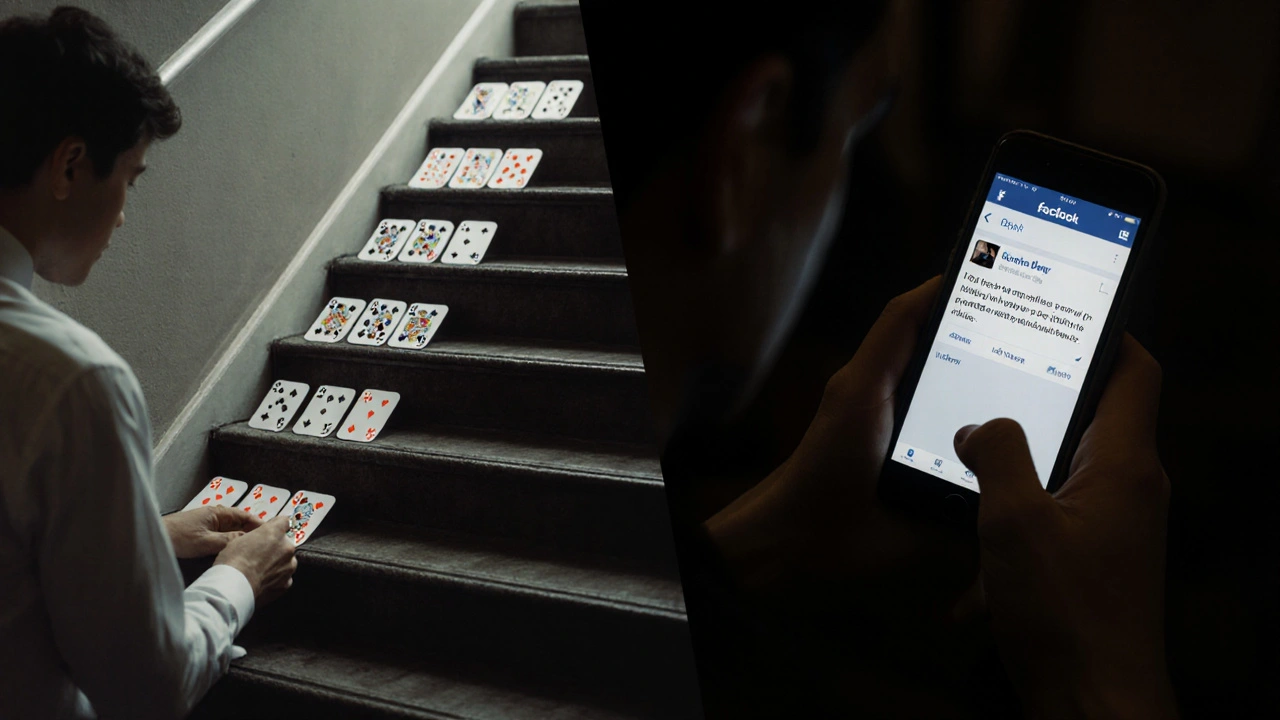Ever watched a mentalist guess your secret number, name your dead relative, or describe the exact card you picked-without touching it-and wondered if they really read minds? They don’t. Not even close. What you’re seeing isn’t magic. It’s psychology, misdirection, and years of practiced observation wrapped in a theatrical show.
The Myth of True Mind Reading
No one can read thoughts like a book. Not psychics, not geniuses, not aliens. The human brain doesn’t broadcast its inner monologue like a radio station. Mentalists don’t tap into neural signals or decode brainwaves. They use what’s already visible: body language, speech patterns, emotional cues, and the way people react under pressure.When a mentalist says, "I’m feeling a name starting with J... maybe your grandfather?"-they’re not hearing your thoughts. They’re using cold reading, a technique that works because most people will nod along to vague, emotionally charged statements. The brain is wired to find meaning in ambiguity. That’s why you feel seen-even when they’re just guessing.
Cold Reading: The Foundation of Mentalism
Cold reading is the backbone of almost every mentalist performance. It’s not magic. It’s math. And statistics.Here’s how it works: A mentalist makes a broad statement like, "I sense someone close to you passed away recently-maybe a parent?" That’s a safe bet. In the U.S., about 1 in 5 people lose a parent before age 65. If you’re performing for a live audience of 100 people, statistically, 20 of them will have lost a parent in the last few years. Now add emotional weight: "They’re trying to tell you something... it’s about forgiveness." That’s not specific-it’s universal. But when someone in the crowd gasps, they think the mentalist knew their secret. They didn’t. They just knew human behavior.
Good mentalists use the Barnum effect-where people believe vague, general statements are uniquely about them. Phrases like "You’re sometimes shy but can be the life of the party" or "You’ve had a major change in your life around age 27" sound personal because they’re true for nearly everyone. Mentalists layer these statements, watching for micro-reactions: a pause, a blink, a shift in posture. Then they double down on what worked.
Hot Reading: The Dirty Secret
Sometimes, mentalists know more than they should. That’s hot reading-and it’s not always ethical.Hot reading means the mentalist has gathered information ahead of time. Maybe they searched social media. Maybe an assistant slipped a note to them. Maybe the audience member filled out a survey before the show without realizing it was for the mentalist. In one famous case, a mentalist on a 2018 TV special appeared to know a woman’s late husband’s last words. Later, it was revealed the husband had posted those exact words on Facebook six months earlier. The mentalist’s team had scoured public profiles.
Hot reading isn’t rare. It’s common in private shows, corporate events, and televised performances. The difference? The audience never knows. And that’s the point. The illusion of supernatural insight depends on secrecy. If people knew the mentalist had Googled them, the magic would vanish.

The Force: Controlling Choices Without Notice
Ever picked a card and thought it was totally your choice? In mentalism, it rarely is.The "force" is a technique where the mentalist guides you to pick a specific item-card, number, word-while making you feel like you’re in control. One common method: the magician shows five cards. Four are different. One is repeated. Your brain naturally picks the one you’ve seen twice. Another version: they hand you a pen and say, "Write down any number between 1 and 10." Then they subtly pause after saying "7," letting it hang in the air. Studies show people are 40% more likely to pick the last number mentioned in a list.
Forcing isn’t about trickery-it’s about psychology. Humans hate uncertainty. When given too many options, we default to what feels familiar, safe, or recently heard. Mentalists exploit that.
Memory Systems and Mnemonics
Some mentalists appear to remember hundreds of names, numbers, or random facts. That’s not a superpower. It’s training.The Method of Loci, used since ancient Rome, involves associating information with locations in a familiar space-like your childhood home. A mentalist might remember a deck of cards by mentally placing each one on a different step of their stairs. Another uses the Major System, where numbers turn into sounds, then words: 3 = M, 5 = L, so 35 becomes "Mule." Suddenly, the number 35 becomes a mental image of a mule carrying a suitcase.
These systems aren’t secret. They’re taught in memory competitions. The difference? Mentalists use them on stage, under pressure, with an audience watching. That’s what makes it impressive-not the memory itself, but the performance of it.

Body Language and Microexpressions
You don’t need to read minds to know what someone’s thinking. You just need to watch their face.Paul Ekman’s research on microexpressions showed that human emotions leak out in less than half a second. A slight lip twitch. A raised eyebrow. A blink that’s too slow. Mentalists train to spot these. When someone lies, their pupils might dilate. When they’re hiding something, they’ll touch their neck or avoid eye contact.
In one experiment, a mentalist asked a volunteer to think of a number between 1 and 10. As they thought, the mentalist watched their hands. The volunteer nervously tapped their left thumb-something they’d done in rehearsal. The mentalist had noticed that habit during a pre-show chat. They didn’t read the number. They read the gesture.
Why We Want to Believe
We don’t just enjoy mentalism-we need it.Science tells us the brain craves patterns, even when none exist. We want to believe there’s something beyond the ordinary. Mentalism gives us that. It’s not about deception-it’s about wonder. The best mentalists don’t trick you. They give you a moment where you forget how the world works.
That’s why, even after you learn the tricks, you still feel something when it happens. Because magic isn’t in the method. It’s in the moment.
What Mentalism Really Teaches Us
The real lesson of mentalism isn’t how to read thoughts. It’s how easily we fool ourselves.We assume we’re rational. We think we’re in control. But mentalism shows us how much we’re shaped by suggestion, expectation, and social pressure. The same techniques that make a card trick work also make advertising, politics, and even dating work.
When you understand how mentalists manipulate attention, you start seeing it everywhere. Why you bought that $200 coffee maker because the salesperson said "everyone loves it." Why you clicked on a headline that said "You won’t believe what happened next." Why you nodded along to a stranger’s vague life advice.
Mentalism isn’t about mind reading. It’s about understanding how minds work.
Can mentalists really read minds?
No. No human can read thoughts directly. Mentalists use psychological techniques like cold reading, hot reading, misdirection, and body language analysis to create the illusion of mind reading. It’s performance, not paranormal ability.
Is mentalism the same as magic?
Mentalism is a branch of magic, but it focuses on the mind instead of physical objects. While a magician might make a coin disappear, a mentalist makes you believe they know your secret thoughts. Both rely on illusion, but mentalism leans harder on psychology and suggestion.
How do mentalists know what I’m thinking during a show?
They don’t. They use a combination of observation, leading questions, forced choices, and pre-show research. For example, they might ask you to think of a number, then use subtle cues to guide you toward a specific one. Or they might have gathered personal details from your social media before the show.
Are mentalism tricks dangerous or manipulative?
Most stage mentalism is harmless entertainment. But some performers use techniques like hot reading or emotional manipulation to exploit vulnerable people-especially in private readings. Ethical mentalists avoid targeting grief, trauma, or fear. Always question anyone who claims real psychic powers or asks for money to "remove negative energy."
Can I learn to do mentalism tricks?
Yes. Many books and online courses teach cold reading, forcing techniques, and memory systems. Start with simple tricks like predicting a card or guessing a number using psychological cues. Practice observing people in everyday conversations. The real skill isn’t in the trick-it’s in understanding human behavior.


Kirk Doherty
November 12, 2025 AT 14:41Been to a few of these shows and honestly the cold reading part always gets me. Like they say 'I sense a loss' and suddenly half the room is crying. It's not magic, it's just knowing how broken people are willing to be heard.
Still gives me chills though.
Dmitriy Fedoseff
November 12, 2025 AT 21:13You think this is just about psychology? Nah. This is colonialism dressed up as entertainment. The same people who exploit grief for cash are the ones who colonized cultures that actually had spiritual traditions. Mentalism isn’t illusion-it’s cultural theft wrapped in a suit.
And don’t even get me started on how they profit off trauma while real shamans get banned as frauds.
There’s a line between performance and predation. Most of these guys cross it daily.
Meghan O'Connor
November 14, 2025 AT 10:44There’s a typo in the third paragraph. It says ‘
’ twice in a row. Also ‘neural signals or decode brainwaves’-should be ‘or decoding brainwaves.’ And why is ‘Barnum effect’ capitalized? It’s not a proper noun. This article reads like it was written by someone who googled ‘mentalism tricks’ 20 minutes ago.Also, ‘force’ isn’t a technique-it’s a verb. You don’t ‘do a force,’ you force a choice. Grammar matters, people.
Morgan ODonnell
November 15, 2025 AT 00:49I used to think this stuff was creepy until I realized how much I do the same thing. Like when I say ‘you seem stressed lately’ to a friend and they open up about their breakup. I didn’t read their mind-I just paid attention.
Most people want to be understood. Mentalists just give them the script to do it themselves.
Kinda beautiful when you think about it.
Liam Hesmondhalgh
November 16, 2025 AT 11:33Hot reading? Please. Everyone knows this stuff. I saw a mentalist on TV last year and his assistant was texting him from the wings. The guy didn’t even try to hide it. This isn’t magic, it’s a scam with better lighting.
And why do Americans always act like they invented psychology? We’ve been doing this since the 1800s in Ireland. Back then we called it ‘the art of the shite’ and it worked better.
Patrick Tiernan
November 18, 2025 AT 10:17So let me get this straight-some guy in a suit tells me my dead dad said ‘I forgive you’ and I’m supposed to be amazed?
Bro. I’ve had worse life advice from my Uber driver.
Also why is everyone acting like this is deep? It’s just emotional manipulation with a stage. I’d rather get scammed by a Nigerian prince.
At least he’s honest about being a scammer.
Patrick Bass
November 19, 2025 AT 21:25Minor point but ‘The Force’ section mentions ‘the last number mentioned in a list’-technically, if you say ‘1 through 10’ and pause after ‘7’, it’s not the last number in the list, it’s the penultimate one. The list is 1,2,3,4,5,6,7,8,9,10. So 7 isn’t last.
Still, the effect is real. Just saying.
Tyler Springall
November 20, 2025 AT 13:03Of course you’re all missing the point. This isn’t about tricks. It’s about the collapse of meaning in modern life. We’ve lost faith in religion, science, and community. So we cling to charlatans who whisper our deepest fears back to us like a lullaby.
That’s why it works. Not because of cold reading. But because we’re starving for something to believe in.
And we’d rather be fooled than alone.